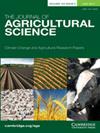Effects of Supplementary Pollination on Macadamia Nut Set, Retention and Yield in Murang’a County, Kenya
IF 2.2
4区 农林科学
Q2 AGRICULTURE, MULTIDISCIPLINARY
引用次数: 0
Abstract
Macadamia is a promising prime dessert nut with the potential of alleviating poverty and enhancing food security in Kenya. Nut set and subsequent development of nuts to maturity is dependent on pollination which is mediated by animals, and honey bees are the dominant macadamia flower visitors. However, macadamia is pollen deficit as not all flowers set develop to mature nuts, thus supplemental pollination results to better nut yields. There is limited information in Kenya among the smallholder macadamia growers on the importance of supplementing pollination to enhance nut yields. This study was conducted at Kandara Macadamia Research Centre and in a smallholder macadamia farm located 15 km from the research centre, which was purposively selected from July 2021 to May 2023. Assessment of the influence of pollinators and supplementing pollination to nut set, retention and final yields was done. Honey bee, (Apis mellifera L.) colonies were also introduced at the Macadamia Research Centre to enhance pollination and mitigate deficits. Racemes were bagged to exclude pollinators, others left open to unlimited pollinator access while others received supplemental hand pollination. The results demonstrate that macadamia is pollen limited and pollination is highly reliant on insect pollinators. There were significant differences (p < 0.001) among the bagged (pollinator exclusion), open and hand pollinated racemes in both farms. The initial nut set and retention was increased significantly (21.54%) in hand pollinated racemes compared to those that were left to open pollination (unlimited pollinator visits) depicting pollination deficit in farm B. Introduction of supplementary honey bee colonies at the Kandara Macadamia Research Centre, resulted to higher nut set, retention, nut-in-shell and kernels. Macadamia growers are encouraged to introduce honey bee colonies in their farms to improve yields and also address pollination deficits.补充授粉对肯尼亚穆郎阿县夏威夷果的结实率、保留率和产量的影响
澳洲坚果是一种前景广阔的优质甜点坚果,具有减轻肯尼亚贫困和提高粮食安全的潜力。坚果的着生和随后的成熟取决于动物的授粉,蜜蜂是澳洲坚果花的主要访客。然而,澳洲坚果缺乏花粉,因为并非所有花朵都能发育成成熟坚果,因此补充授粉可提高坚果产量。在肯尼亚,关于补充授粉对提高坚果产量的重要性,小农澳洲坚果种植者的信息很有限。这项研究是在坎达拉澳洲坚果研究中心和距离研究中心 15 公里处的一个小农澳洲坚果农场进行的,研究时间为 2021 年 7 月至 2023 年 5 月。研究人员评估了授粉者和辅助授粉对坚果坐果率、保留率和最终产量的影响。澳洲坚果研究中心还引进了蜜蜂(Apis mellifera L.)蜂群,以加强授粉和缓解赤字。将总状花序装入袋中以排除授粉者,其他花序则敞开以让授粉者无限制地进入,而其他花序则接受人工授粉的补充。结果表明,澳洲坚果的花粉有限,授粉高度依赖昆虫授粉者。在两个农场中,袋装(排除授粉者)、开放和人工授粉的总状花序之间存在明显差异(p < 0.001)。与开放授粉(授粉者访问次数不限)的葡萄相比,人工授粉葡萄的最初坚果坐果率和保留率显著提高(21.54%),说明 B 农场授粉不足。鼓励澳洲坚果种植者在其农场引进蜜蜂群,以提高产量并解决授粉不足的问题。
本文章由计算机程序翻译,如有差异,请以英文原文为准。
求助全文
约1分钟内获得全文
求助全文
来源期刊

Journal of Agricultural Science
农林科学-农业综合
CiteScore
2.80
自引率
5.00%
发文量
68
审稿时长
1.4 months
期刊介绍:
The Journal of Agricultural Science publishes papers concerned with the advance of agriculture and the use of land resources throughout the world. It publishes original scientific work related to strategic and applied studies in all aspects of agricultural science and exploited species, as well as reviews of scientific topics of current agricultural relevance. Specific topics of interest include (but are not confined to): all aspects of crop and animal physiology, modelling of crop and animal systems, the scientific underpinning of agronomy and husbandry, animal welfare and behaviour, soil science, plant and animal product quality, plant and animal nutrition, engineering solutions, decision support systems, land use, environmental impacts of agriculture and forestry, impacts of climate change, rural biodiversity, experimental design and statistical analysis, and the application of new analytical and study methods (including genetic diversity and molecular biology approaches). The journal also publishes book reviews and letters. Occasional themed issues are published which have recently included centenary reviews, wheat papers and modelling animal systems.
 求助内容:
求助内容: 应助结果提醒方式:
应助结果提醒方式:


